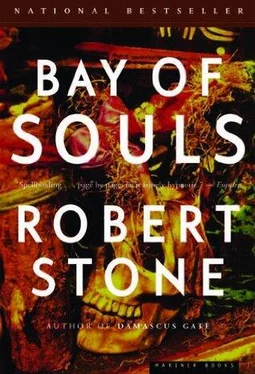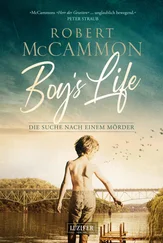"You know the American presence down there is extensive. The intelligence services of the old regime can't even tell us where they are. Wherever Junot's army is in the field, the yanquis are with him. They seem to control the roads. So you and Roger will have to get on with Junot. The Americans ask him everything."
She wanted to tell him it meant nothing to her. Of course she knew better. Ironic, she thought, that a charmless torturer like Trip should appeal to one's confiding impulses.
"So," he said, "Junot will speak to the Americans, the ones who matter. Roger Hyde will speak to the Colombian militias."
"Roger is almost ready to retire. When the hotel is sold he'll return to Mexico." That was the way she wanted things to go.
"Perhaps he can cooperate for a while. A few stones to the malls of Boca and Hilton Head. Until the debt is paid."
Lara nodded. When the interview was over, the man who called himself Triptelemos clicked his heels, in the style of his national army.
"Good luck with your American protectors," Colonel Trip said. His saying it alarmed her. It made her wonder how much he truly knew.
Triptelemos, they said, had read French poetry to the people he was taking out to drop, alive, into the South Atlantic. His crew would push them out at the moment the disk of the sun disappeared over the horizon. Or else the moment the disk appeared. He had a handkerchief to dry their tears. Sometimes it was a wife's handkerchief, the scent suddenly recognized by the condemned, a cruel recall in the dazzle of the horizon. Or that of a husband, or a mother.
"I confound the wise professors," Triptelemos liked to say. "I make the machos cry.
"Sometimes," he would say, "they are so like children. Children again, and I am their father. 'Papi?' Sniveling, no sarcasm now. 'Are there sharks?' We would reassure them. 'In the South Atlantic? Off this continent? Never. You will see.'"
It was after ten when she arrived at her suite at the Mayflower. In time for the last subway, she went out. Nobody seemed to be observing, but it was finally impossible to tell. Walking toward Dupont Circle, she found a public telephone and called the dummy number.
On Connecticut Avenue she took the subway to the Zoo, then walked back toward Kalorama. There was an Ethiopian restaurant on Newark Street, still open, still serving a mixed clientele of East Africans and Washington After Dark. In a rear booth, a young woman in jogging clothes was drinking nonalcoholic beer. She had long, straight black hair, quite dark skin and Semitic features. The woman really might be anything, Lara thought, taking a seat across the table from her.
"So what's this?" the woman asked her.
"This is life after John-Paul."
"Yeah, we know that," the young woman said. "Tough. AIDS, right?"
"So," Lara said, "this is, We never did what you thought we did."
"Fuck you didn't."
"We never did what you thought we did. People on the Hill could have told you that."
"Uh-huh? Oh really?"
"And we are out of it now. Out of it because we're selling the place. I mean, check it out."
"You know what? You're not out of it. We'll tell you when you're out of it. My man got your ass skinny-dipping with Fidel on his wall. Picture's right under Mr. President's. You owe us something."
"I take a risk, you see. To set the record straight."
"We keep the records. We'll set you straight."
"You're so rude," Lara said.
"Yeah," said the young woman. "We're just policemen. We don't have the background."
ON A SPRINGLIKE Sunday full of sparkling sunlight and warm confiding breezes, the Ahearn family went to Mass. A little before ten o'clock, the three of them trooped up the slate steps of St. Emmerich's. It was a white wooden church whose central structure stood flanked by twin pointed towers tipped with Prussian blue. St. Emmerich's was a German foundation, different in every subtle way from the Frenchified Irish church across town.
They went single file, Kristin tall in the lead. One step behind, Michael trudged eyes down, containing his sick hangover. Young Paul followed him, looking abstracted and melancholy, occasionally rousing himself to a few moves of the insolent swagger he was trying to practice unobserved. He had brought it home from school.
At the top of the steps, Michael turned to look at him.
"What's the matter with you? You have a sore back or something?"
Paul straightened up but declined to answer. Watching closely, Michael thought he saw a second's glint of unfocused defiance.
He followed his wife into the sensory explosion of stale incense, varnish, old wood and lilies. The church interior was a pattern of grays, no sculpted altar but a stark table, the simple mensa, on which two candles burned. Each opaque gray window held a single decorated pane showing a stylized icon. Behind the sacrificial table a sanctuary lamp glowed before a gray banner displaying the Chi-Rho.
Michael stepped aside to let his wife and son into the rear pew he had chosen. Paul genuflected and crossed himself. Michael and Kristin blundered into eye contact, exchanged a bleak unseeing glance and sat down.
From his place Michael could watch the church fill. There was always a small colorful contingent from the university. The aged Professor Doroshenko, a philologist and an immensely learned authority on Slavic myth, led his failing wife to a place near the front. The professor's many tomes on wood sprites and river elves were regularly released by an émigré press in Winnipeg. Behind the Doroshenkos Mr. Giorgio and Mr. Cushing, a pair of middle-aged gay librarians of signal piety, knelt in prayer. Beside them sat Dr. Almeida with his wife and four of his children. The prolific doctor was a Goan and a savant at the computer center. Then there were the few dozen students, whom the church did its best to make welcome. They were mostly young women, away from home for the first time.
The rest of the congregation consisted of the townies and farmers. Three, sometimes four generations, descendants of the nineteenth-century Rhenish and Bohemian settlers, still showed up each week, ancients and babes in arms. The rural churches were being closed and consolidated; circuit-riding priests equipped with folding communion sets and cassettes of Tennessee Ernie's Sacred Songs spent long weekends holding Mass in half a dozen ruinous sanctuaries among the rows of soybeans. Only a scant fraction of the family farms remained out there.
The Germans were lumpy-faced and broad-shouldered, clear-eyed and scrubbed. Their young folk were freckled and fair, possessed, it seemed, of a radiant innocence.
Across the church, he saw a man named Harold Lawlor, who with his wife, Frances, constituted the dynamic of the local anti-abortion struggle. Michael put his glasses on and assumed an easy stance from which he thought he might observe Mr. Lawlor at his Sabbath devotions, telling his beads, eyes raised in the Maiden's Prayer.
Lawlor's elderly cousin, a man named Brennan, had shot a priest in South Dakota — crippled him for life — for permitting a twelve-year-old girl to assist at Mass. Brennan had insisted on altar boys; it was said he had spent the day of the shooting stalking the twelve-year-old, whose young life was preserved from his nine-millimeter bullet by chance. The plea had been Alzheimer's. Brennan was eighty and had died the same year. A martyr.
Watching Mr. Lawlor's watery blue eyes fixed on the numinous, Michael gave way to a spasm of rage; his jaw trembled. His fists contracted to claws. He had to remind himself that this man was not the shooter. As Michael watched, he completed the last decade of his rosary. Oh, the sorrowful mysteries! thought Michael. Lawlor crossed himself with the chaplet's crucifix, kissed it and fixed his rheumy gaze once more on unending bliss.
Читать дальше












